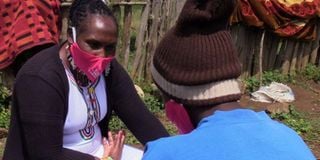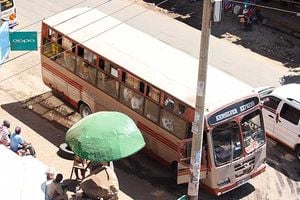Teen pregnancy: Class Five pupil rescued from marriage

What you need to know:
- 13-year-old gets married a week after giving birth in Homa Bay County.
- Local businessman, currently in hiding, is alleged to be the father to the minor’s child.
- The girl was rescued from the marriage, not to her child's father, three days later.
- In Meru, about 170 girls aged below 14 years got pregnant between January and mid-June this year.
- Meru county government and partners initiated young mothers’ clubs to address the impact of teen pregnancies.
- The teenagers undergo mentorship and counselling to enable them go back to school, while others are encouraged to acquire skills.
- Nanyuki official says the 'stay at home directive' over Covid-19 revived the role of traditional birth attendants in the remote parts of the country.
- Laikipia MCA said there is need for the society to educate teenagers on contraceptive use.
A Class Five pupil who gave birth a week ago has been rescued from marriage in Suba sub-county.
The 13-year-old went missing from her parents’ home in Suba East sub-location in Kaksingri East Location last week after giving birth.
She allegedly moved in with a different man other than the father to her child, at Kibwer sub-location. Three days later, she was rescued after her brother alerted her head teacher and local administration of her whereabouts.
“I am happy my girl is back home. Her brother reported to me that she got married, so I wrote a letter, which together with another from our area assistant chief, were sent to the chief of the area the girl was married,” said the head teacher.
A local businessman, currently in hiding, is alleged to be the father to the minor’s child.
“She had revealed the identity of the man who defiled and impregnated her. We have reported him to the authorities ,” the head teacher said.
Suba South Deputy County Commissioner Joseph Maina, said the case is being handled by Directorate of Criminal Investigations officers.
SAD REALITY
The sad reality is that teenage pregnancy is high across the country.
In Meru, about 170 girls aged below 14 years got pregnant between January and mid-June this year.
These are among 5,270 teenage pregnancies recorded through the Kenya Health Information System in the county.
The data shows that another 5,100 pregnant girls aged between 14 and 19 years visited various hospitals in the county.
North Imenti Sub-county had the highest number of pregnant 10-14-year-olds with 80 girls followed by South Imenti with 31.
According to hospital data, Igembe South recorded the highest number of teen pregnancies at 979 followed by Igembe Central with 978 and Igembe North, 823 girls. Others are Imenti South 587, North Imenti 440, Tigania West 412, Central Imenti, 310, Tigania Central, 256, Buuri East, 230, Tigania East, 143 and Buuri West 112.
Last year, Meru County government in partnership with Johns Hopkins Program for International Education in Gynaecology and Obstetrics (Jhpiego), a non-governmental organisation, initiated young mothers’ clubs to address the impact of teen pregnancies.
The initiative was aimed at eradicating stigma among teen moms, ensuring they resume education and access health care.
ATTEMPTED SUICIDE
A report by the Ministry of Education, last year, showed Meru as among counties with high cases of teen pregnancies.
“We have formed young mothers clubs at Mikinduri, Muthara, Kangeta, Nyambene and Mutuati sub-county hospital, where about 100 teenagers meet for mentorship. We realised many teenagers face rejection from parents, friends and school after they fall pregnant. This has led to some contemplating suicide,” Meru health official Doris Muriuki said.
She noted that three cases of attempted suicide attributed to stigma were reported in Tigania East last year.
Ms Muriuki said the teenagers have been undergoing mentorship and counselling to enable them go back to school, while others are encouraged to acquire skills.
Meru Health Executive Meshack Mutuma, said the county government was engaging community health volunteers to monitor teen moms and ensure they resume normal life.
Mr Mutuma, however, warned teenagers against engaging in sex, while calling for enhanced education among children to curb teen pregnancies.
The Ministry of Education report indicated that 11,950 primary and secondary schools’ girls countrywide got pregnant in 2018, with unreported cases said to be higher.
A humanitarian organization has also raised concern over the rising number of teenage pregnancies in the country, warning there could be more unreported cases during the Covid-19 pandemic.
One More Day for Children (OMDC) foundation director Hellen Gathogo, said myriads of pregnant girls have not been to health facilities since the first virus infection was reported in the country.
TRADITIONAL BIRTH ATTENDANTS
She spoke in Nanyuki town during a workshop on implication and response on population and development organised by the National Council for Population and Development.
"As a professional working at the grassroots, I believe there are many cases that have not been captured in the recently released data because it is anchored on teenagers who could access health services. Unless there are health complications that demand teenager to seek medical attention, many of them shy off from visiting the health facilities," Ms Gathogo said.
She said the 'stay at home directive' to curb the spread of Coronavirus has revived the role of traditional birth attendants in the remote parts of the country.
"There are traditional birth attendants who have been taking care of expectant teenagers at the grassroots. The births are not recorded at the health facilities. It is sad that cases of incest in the communities are also high during this period," Ms Gathogo, who is also the vice chairperson of Laikipia County Education Board said.
"I have a feeling many girls will not be able to report back to school. We urgently need to embrace the traditional value systems where a child does not only belong to the family, but the entire society," she added.
Laikipia MCA Catherine Nyawira said there is need for the society to educate teenagers on contraceptive use.
"We need to educate our children about the use of contraceptives because most of them have become intimates at a very young age. Clearly, we are living in a modern world and facing similar challenges to other developed countries," the lawmaker who is also a member of the County Assembly's education committee said.






